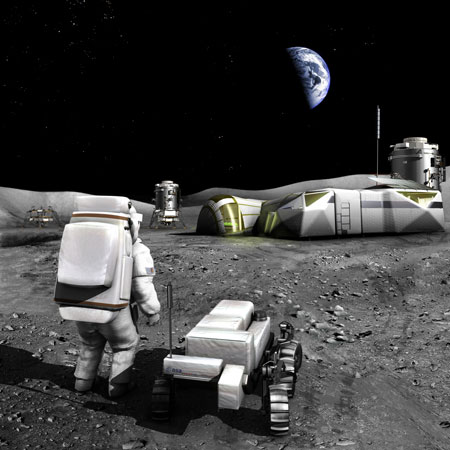| Jun 23, 2014 |
Mining the Moon: Panel at EuroScience Open Forum (ESOF) 2014
|
|
(Nanowerk News) Who owns the moon? What kind of valuable resources does Earth’s nearest neighbor hold? And how – and when – can we access them? All these questions will be debated today by a panel comprised of scientists, entrepreneurs and policy makers brought together by Google Lunar XPRIZE at the EuroScience Open Forum (ESOF) 2014, Europe’s largest general science meeting.
|
 |
|
To date, only three nations – the USA, Russia and China – have soft-landed a spacecraft on the moon, although many nations have launched successful lunar orbiters. But the stakeholders in space are changing: lunar exploration is no longer the domain of Governmental agencies alone. With activities like the Google Lunar XPRIZE and private-public partnerships stimulating a New Space industry, commercial organizations have business plans and are attracting investment to develop low-cost, regular, reliable access to the moon within a decade.
|
|
New Space entrepreneurs are looking to the moon’s supplies of rare metals, minerals, and – perhaps most importantly – water-ice to sustain their business in the long term. Water and organics are key to the development of life-support systems for any future human settlement on the moon. In addition, water can be broken down into hydrogen and oxygen that can be used for rocket fuel. With only one sixth of the Earth’s gravity and no atmosphere, the moon is an ideal launch site for large, heavy spacecraft needed to support manned missions to Mars and even further out into the solar system.
|
|
However, the moon’s resources are not distributed evenly over the lunar surface. The majority of water on the moon is concentrated in ice deposits in or near deeply shadowed, dark craters at the poles. Access to these sites is vital, if the moon is to be used as a future base and stepping-stone for exploration of the rest of the solar system.
|
|
A distinguished panel has been brought together by Google Lunar XPRIZE to discuss ‘Mining the Moon’ at ESOF 2014:
|
|
Bernard Foing is the Executive Director of the International Lunar Exploration Working Group (ILEWG) and Senior Exploration Officer at ESA/ESTEC, He has been the Lead Project Scientist for SMART-1, the first European mission to the moon.
Robert Böhme is the CEO and Team Leader of the Part-Time Scientists, one of the 18 teams competing for the Google Lunar XPRIZE.
Britta Thomsen has been a member of the European Parliament since 2004. She was a full member of the committee of industry, research and energy and rapporteur on various reports on energy and science. She has also been coordinator in the gender equality committee.
|
|
“We do not have decades to come up with answers to these important questions about exploring the moon. A fleet of international missions has already started to prospect and map the distribution of mineral resources, and water-ice,” says Bernard Foing. “The Outer Space Treaty specifies that no country or citizen owns the moon. With international cooperation towards a world strategy for the exploration and utilization of the moon, we can exploit responsibly scarce lunar resources and still preserve sites of historic and scientific interest. Precursor landers can be operated in a coordinated robotic village, with in-situ use of resources, done with respect. This would prepare a sustainable and smart path towards humans living off the land in international lunar bases.”
|
|
|
|
As one of the 18 teams competing for the Google Lunar XPRIZE, the Part Time Scientists aim to be in the vanguard of lunar entrepreneurs with their sights set on the establishing commercial activity on the moon within the next 5 years. The team’s CEO, Robert Böhme, says, “The first thing that will be needed is infrastructure. The Part Time Scientists, along with some of our competitors in the Google Lunar XPRIZE, aim to develop networks of small robotic landers to provide power, communications and bandwidth that can support a range of activities on the lunar surface. We are even looking at the possibility of establishing secure data storage centers dug down into the lunar soil.”
|
|
The discussion is taking place on Monday, 23 June, 2014 from 4:30pm – 5:45pm in Big Carl, Dance Halls, Copenhagen, Denmark. Follow the conversation at social tags @glxp and #ESOF2014.
|

